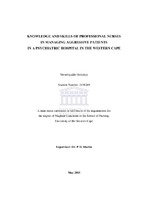| dc.description.abstract | Background: Mental illness has become more common than many other diseases such as heart disease, cancer or diabetes. Aggression or violence by patients towards psychiatric nurses is a global issue. These nurses, therefore, face the huge challenge of providing nursing care to aggressive psychiatric patients. Without the necessary knowledge and skills, the nurses are vulnerable to all kinds of injuries, given the time spent managing aggressive patients. Purpose and objectives: The purpose of the study was to determine the level of knowledge and skills that professional nurses possess to manage the aggression of psychiatric patients. The objective of the study was to ascertain whether the knowledge and skills of professional nurses were sufficient to manage aggressive psychiatric patients.
Method: A quantitative approach and descriptive design was used to conduct this study at a Psychiatric Hospital in the Western Cape, South Africa. The target population consisted of 149 professional nurses employed at the Psychiatric Hospital. The sample for the study was all-inclusive i.e. all professional nurses employed at the hospital. Only 70 participants were available for the study. Structured questionnaires were distributed to the participants for data collection and the response rate was 77% (n=54). Data analysis was done with the aid of a statistician using a Statistical Package for Social Science, version 22, and nominal as well as ordinal data was analysed using descriptive analysis. The process and purpose of the study was explained to the participants, who gave their consent, prior to the distributing of the questionnaires. The researcher obtained permission from the necessary authorities before commencing with the study. Findings: The study found that nurses were more likely to be exposed to verbal aggression as opposed to sexual aggression. It also revealed that nurses with less years of experience had more knowledge than their counterparts who had more years of experience in same position. Furthermore, the study revealed that those who had training in aggression management reported that the training did not meet their needs. Overall, the findings revealed that nurses had a fair knowledge of managing aggressive psychiatric patients. The overall findings also revealed that professional nurses had the required skills to manage aggressive patients. Recommendations: There is a need for on-going in-service training and refresher courses in the management of aggression. There should also be a needs analysis before commencing with these training courses which should be made compulsory for all staff to attend. Further studies should be conducted on the different categories of nurses, and other disciplines within nursing, to ascertain their knowledge of the management of aggression. Qualitative studies should also be conducted on nurses‟ experience of aggression in different settings. | en_US |

